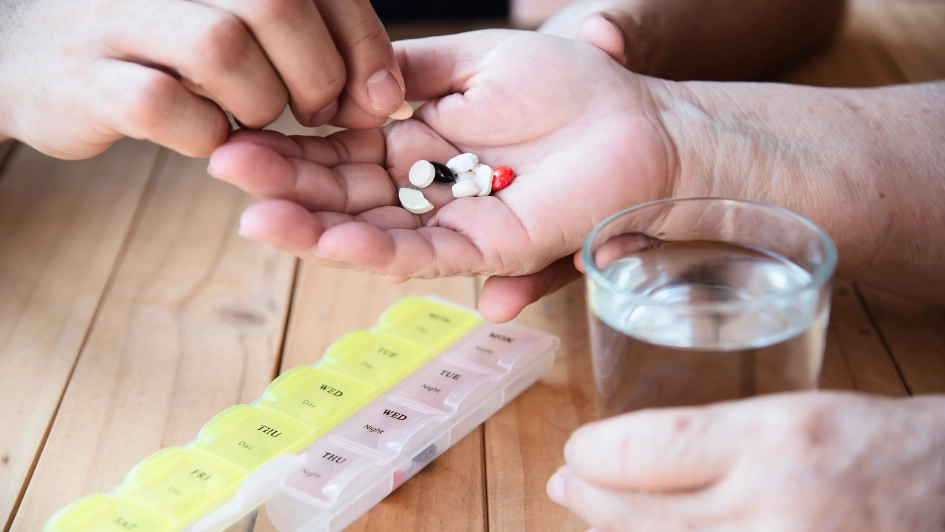If you’re exploring tirzepatide as a treatment option, knowing potential tirzepatide side effects is key. Our focused guide outlines what side effects you might encounter, from everyday gastrointestinal hiccups to less common but noteworthy concerns, equipping you with the full picture minus the medical jargon.
Key Takeaways
Tirzepatide is an effective weight management medication with a dual receptor agonist function leading to significant weight loss, reduced appetite, and improved cardiometabolic risk factors.
Common side effects of tirzepatide are primarily gastrointestinal, including nausea and vomiting, with potential injection site reactions; serious adverse reactions may involve thyroid cancer risk and renal or cardiovascular issues.
Long-term use of tirzepatide for weight management requires regular health monitoring, especially for specific populations such as the elderly, pregnant, or breastfeeding women, while managing dosage and drug interaction precautions.
Understanding Tirzepatide and Its Role in Weight Management
Delving into the workings of tirzepatide, it becomes clear that:
- This drug is no ordinary player in the game of weight management.
- Tirzepatide’s dual receptor agonist function is a significant factor in its ability to lower glycated hemoglobin levels and promote weight loss.
- Moreover, it has demonstrated remarkable efficacy across different dosage levels, making it versatile and effective for a broad spectrum of patients.
At its core, tirzepatide significantly contributes in improving cardiometabolic risk factors. This is evident in its effects on lowering blood pressure and improving lipid profiles, leading to a significant reduction in body weight. The comprehensive weight control center of our body responds positively to tirzepatide, leading to an improved state of health. It’s no wonder that in the realm of weight management, tirzepatide has led the charge.
The Mechanism Behind Weight Reduction
The effectiveness of tirzepatide is rooted in its mechanism. By mimicking the functions of GLP-1 and GIP hormones, known as incretins, tirzepatide promotes insulin release after meals, contributing to weight management. The activation of receptors by tirzepatide leads to reduced appetite and food intake, significantly aiding in weight loss.
Furthermore, the slowed gastric emptying due to its incretin hormones mimicry leads to further reduction of body weight. In animal models, the dual agonist activity has shown synergistic effects in reducing body weight, food consumption, and fat mass, which may translate to benefits in humans.
Achieving Additional Weight Loss
The impact of tirzepatide extends beyond initial weight loss. Sustained treatment with tirzepatide not only maintains but can also augment initial weight reduction, leading to further reductions in body mass index and body weight. Clinical trials have demonstrated that patients who continue tirzepatide therapy experience ongoing weight loss compared to those who were shifted to a placebo.
- Tirzepatide can lead to sustained weight loss.
- Patients who continue tirzepatide therapy experience ongoing weight loss.
- Tirzepatide can help reduce body mass index and body weight.
In fact, after an additional year of tirzepatide treatment beyond initial weight loss, patients have been shown to lose an extra 5.5% of their body weight, whereas those who switched to placebo regained 14% of their weight. The SURMOUNT-3 trial underlines the effectiveness of tirzepatide in achieving substantial additional weight loss when following an initial 12-week intensive lifestyle intervention, during which participants already lost weight.
Common Side Effects of Tirzepatide
While tirzepatide brings numerous benefits, it’s also important to comprehend its side effects. Gastrointestinal adverse events such as:
- Diarrhea
- Nausea
- Vomiting
- Decreased appetite were frequently reported with tirzepatide use. Stomach pain, heartburn, and difficulty swallowing are common gastrointestinal disturbances experienced by patients on tirzepatide. As the body adjusts to the medication, some patients might experience:
- Acid or sour stomach
- Belching
- Constipation
- Diarrhea
- General stomach discomfort or upset
In addition to gastrointestinal issues, another area of concern is the injection site. Reactions can include symptoms such as bleeding, pain, itching, rash, swelling, and other skin conditions. Furthermore, tirzepatide can cause difficulty in breathing, fast heartbeat, skin itching, rash, redness, and vomiting.
But don’t let these side effects deter you. They are part of the body’s adjustment process and are manageable with the right approach.
Gastrointestinal Reactions
Examining the gastrointestinal side effects reveals a range of symptoms. These include:
- Nausea
- Vomiting
- Stomach pain
- Heartburn
- Gaseous stomach pain
- Stomach fullness
- Acid or sour stomach
- Belching
- Constipation
- Diarrhea
- Stomach discomfort or upset
Patients are advised to monitor gastrointestinal-related side effects, particularly with increasing doses of tirzepatide. They can manage symptoms with dietary counseling, symptomatic medications, or, if necessary, skipping a single dose.
Injection Site Considerations
Regarding injection site reactions, patients might experience the following at the injection site:
- Bleeding
- Blistering
- Burning
- Coldness
- Discoloration of the skin
- Pain
- Soreness
- Stinging
- Swelling
- Tenderness
- Warmth
- Pressure
- Hives
- Infection
- Inflammation
- Itching
- Lumps
- Numbness
- Rash
- Redness
- Scarring
- Tingling
- Ulceration
These reactions can occur following tirzepatide administration.
Serious Adverse Reactions to Be Aware of

Besides manageable common side effects, it’s equally imperative to recognize serious adverse reactions. Among the serious potential side effects of tirzepatide is an increased risk of thyroid cancer. Furthermore, tirzepatide may also pose risks for acute kidney injury, making it essential to consider renal function before and during treatment. Cardiovascular disease considerations are critical when prescribing tirzepatide, as it may exacerbate pre-existing heart conditions.
While these adverse reactions may seem alarming, it’s worth noting they occur infrequently. However, being aware of them and monitoring any changes in health, as well as considering one’s medical history, can help patients manage their treatment effectively and ensure its maximum benefits.
Endocrine and Thyroid Concerns
Patients with a history of thyroid issues, including thyroid tumors, should exercise caution when using tirzepatide. This medication is contraindicated in individuals with a personal or family history of medullary thyroid carcinoma or multiple endocrine neoplasia syndrome type 2, recommending physical examination for thyroid nodules during regular check-ups.
The value of routine monitoring of serum calcitonin and the use of thyroid ultrasounds for the early detection of medullary thyroid carcinoma and thyroid C cell tumors in patients treated with tirzepatide is uncertain. However, routine thyroid monitoring in tirzepatide users may lead to an increased risk of undergoing unnecessary medical procedures.
Kidney and Cardiovascular Implications
Tirzepatide may increase heart rate, which poses a risk of tachycardia, particularly when combined with medications with sympathomimetic or anticholinergic properties. Healthcare providers should exercise caution when tirzepatide is used alongside other medications that can increase heart rate, to manage the additive effect on heart rate.
Monitoring for signs of dehydration is essential for tirzepatide users to prevent the risk of acute kidney injury and potential kidney disease, due to the medication’s gastrointestinal adverse reactions. Despite the risks, the weight loss attained through tirzepatide treatment may improve cardiovascular risk factors, benefiting overall heart health.
Navigating Dosage and Missed Doses

Proper dosage and appropriate action on missed doses are key to the effective use of tirzepatide. Here are the recommended dosages:
- The initial adult dose of tirzepatide for type 2 diabetes is 2.5 mg subcutaneously once a week, with the option to increase to 5 mg after 4 weeks for enhanced glycemic control.
- Dosage increases can continue in 2.5 mg increments after at least 4 weeks on the current dose, not exceeding a maximum dose of 15 mg once a week.
- For weight loss in adults with obesity or overweight, the maximum tolerated dose determined during the lead-in period can be either 10 mg or 15 mg once weekly.
In case a dose is missed, it should be administered as soon as remembered within 4 days (96 hours); if the period exceeded, the missed dose should be skipped and the next dose should be taken on the scheduled day. If it is necessary to change the day of weekly administration, there should be a minimum interval of 3 days (72 hours) between doses.
Adjusting Your Dose
Adjusting tirzepatide dosage should be done carefully, considering potential side effects and working closely with a healthcare provider. Dose adjustments during the initial period of tirzepatide treatment are based on a structured approach, as exemplified by the SURMOUNT-4 trial’s dose escalation protocol, which begins with a 2.5 mg dose and is gradually increased every 4 weeks to reach the maximum tolerated dose.
With higher doses of tirzepatide, it’s important to be vigilant for an increased occurrence of gastrointestinal symptoms such as nausea and decreased appetite, and to adjust the dose carefully if symptoms of hypoglycemia appear, especially in combination with other diabetes medications. Patients are advised to work closely with their healthcare provider to adjust the dosage of tirzepatide, ensuring minimization of side effects while sustaining the medication’s weight loss benefits.
Handling a Missed Dose
If a dose is missed, it should be taken within 4 days or skipped, without altering the regular dosing schedule or doubling doses. If a dose of tirzepatide is missed, it should be administered as soon as possible within 4 days (96 hours) after the missed dose to maintain the original once-weekly dosing schedule. Should the missed dose not be taken within the 4-day window, it must be skipped, and the patient should await the next regularly scheduled dose without trying to make up for the missed one.
Patients with high blood pressure are advised against altering their regular dosing schedule or doubling doses, as this could disrupt blood sugar control and potentially lead to side effects.
Drug Interactions and Precautions

It is vital to understand the possible drug interactions and precautions when using tirzepatide. Tirzepatide has been shown to interact with 396 different drugs, with varying degrees of interaction severity. It is important for patients to consult their healthcare provider before starting or stopping any medication, including blood thinners, while taking tirzepatide. Tirzepatide also has 3 known alcohol/food interactions. Here are some key points to keep in mind:
- Consult your healthcare provider before starting or stopping any medication while taking tirzepatide.
- Pay special attention if you are taking blood thinners, as there may be interactions with tirzepatide.
- Be aware of the 3 known alcohol/food interactions associated with tirzepatide.
Tirzepatide’s pharmacokinetic characteristics do not seem to be significantly influenced by renal impairment, suggesting that dose adjustment may not be required in patients with renal impairment or those undergoing dialysis.
Potential Interaction with Other Medicines
Potential interactions with other medications may require dose adjustments or special precautions as some interactions could increase the risk of side effects. To reduce the risk of hypoglycemia, dosage adjustments of insulin and/or sulfonylurea may be needed when used in combination with tirzepatide. Out of 396 drug interactions with tirzepatide identified, 2 are major, 393 are moderate, and 1 is minor, necessitating different levels of clinical concern and management.
Major drug interactions with tirzepatide are considered highly clinically significant and should be avoided, whereas moderate and minor interactions require careful monitoring or special conditions.
Lifestyle and Dietary Considerations
Lifestyle and dietary considerations are equally important when taking tirzepatide. The use of tirzepatide with alcohol should be done cautiously as alcohol may affect blood glucose levels in patients with diabetes. Patients on tirzepatide should limit alcohol intake and avoid drinking on an empty stomach or after exercise to prevent hypoglycemia, particularly if their diabetes is well-controlled.
Long-Term Use and Health Monitoring
Consistent use of tirzepatide is required for lasting weight loss since discontinuation can lead to significant weight regain. Clinical evidence from the SURMOUNT-4 trial supports the necessity of continued treatment with tirzepatide to maintain and enhance weight loss benefits initially achieved. Individuals who halted tirzepatide treatment and switched to placebo during a study experienced a weight regain of 14%, in contrast to those who persisted with the medication, who continued to reduce their weight by an additional 5.5%.
Regular health check-ups, including monitoring hemoglobin A1c and body weight, are crucial for people taking tirzepatide to ensure early detection of any adverse effects, such as diabetic retinopathy or gallbladder issues. There is a recognized need for more research to understand the long-term risks and benefits associated with the lifelong use of tirzepatide.
Importance of Intensive Behavioral Therapy
Combining intensive lifestyle interventions with tirzepatide can yield substantial further weight loss and bolster weight maintenance. Intensive lifestyle intervention is a critical element in obesity management, entailing a low-calorie diet, heightened physical activity, and behavioral counseling to achieve average weight reductions of 5-8% from initial body weight. Tirzepatide enhances the outcomes of intensive lifestyle interventions by altering hunger and satiety signals, contributing to improved weight loss results.
The combination of tirzepatide with behavioral therapy has been shown to lead to significant additional body weight reduction, offering a potent collaboration or additive option to conventional weight maintenance strategies.
Regular Health Check-Ups
Periodic health check-ups are vital to monitor cardiovascular risk, renal function, and other potential side effects in individuals using tirzepatide. Regular health check-ups are essential for monitoring cardiovascular risk in patients treated with tirzepatide.
The SURPASS-CVOT cardiovascular outcome trial is of importance as it compares tirzepatide, a diabetes drug, with dulaglutide in type 2 diabetic patients at high risk for cardiovascular events.
Although asymptomatic elevations in lipase and amylase are not uncommon in users of tirzepatide, regular symptom-monitoring is more pertinent than tracking these markers without any symptoms.
Special Considerations for Specific Populations
Specific populations such as the elderly, pregnant or breastfeeding women, and those with pre-existing conditions require special attention. Tirzepatide is not recommended for use during pregnancy due to a lack of sufficient studies to determine its safety for the fetus. There is also insufficient data on the presence of tirzepatide in breast milk, and its effects on the breastfed child or milk production.
Older adults may be more sensitive to the side effects of tirzepatide and may require dosage adjustments and close monitoring. Patients with the following conditions should be closely monitored when using tirzepatide:
- History of pancreatitis
- Diabetic retinopathy
- Renal impairment
- Severe gastrointestinal disease
- Thyroid disease
- Type 2 diabetes when tirzepatide is used in combination with insulin or sulfonylureas
Tirzepatide can exacerbate these conditions.
Age-Related Sensitivities
Elderly patients might exhibit increased sensitivity to tirzepatide’s side effects, necessitating vigilant monitoring and dosage adjustment.
Tirzepatide has a greater impact on elderly patients compared to younger adults, as they are more susceptible to its effects. This heightened sensitivity is important to consider when prescribing medication to this age group. Due to increased sensitivity, older adults require careful monitoring to manage potential side effects from tirzepatide.
Pregnancy and Breastfeeding
Due to limited data on its safety for the fetus and potential presence in breast milk, tirzepatide is not advised during pregnancy or breastfeeding. Tirzepatide should not be used for at least 2 months prior to a planned pregnancy. Animal studies have suggested that tirzepatide may cause adverse embryo-fetal effects such as teratogenicity, fetotoxicity, and abortion when administered during organogenesis at clinically relevant exposures. While tirzepatide is generally not recommended for use during pregnancy, it may be considered if the potential benefits to the mother outweigh the risks to the fetus.
Due to the absence of adequate studies, the risks of tirzepatide during breastfeeding have not been established, requiring a careful consideration of potential benefits against potential risks.
Summary
In conclusion, the journey with tirzepatide is a promising one. From understanding its mechanism in weight management to navigating dosage and handling missed doses, from being aware of potential side effects to recognizing the importance of long-term use and regular health check-ups, tirzepatide has proven to be a potent tool in the fight against obesity. However, like any powerful tool, it requires a careful and knowledgeable hand to wield. With the right approach, tirzepatide can indeed be a game-changer for those battling with weight management.
Frequently Asked Questions
What should you avoid while taking tirzepatide?
While taking tirzepatide, you should avoid drinking alcohol on an empty stomach or following exercise, as it may increase the risk of hypoglycemia. Also, be mindful of potential interactions with other medications, supplements, vitamins, and herbs.
What is the mechanism behind tirzepatide’s weight reduction effect?
The mechanism behind tirzepatide’s weight reduction effect lies in its ability to mimic the functions of incretin hormones, promoting insulin release after meals and reducing appetite and food intake, thus contributing to weight management.
What are the common side effects of tirzepatide?
The common side effects of tirzepatide include gastrointestinal issues such as diarrhea, nausea, vomiting, and decreased appetite, as well as injection site reactions like bleeding, pain, itching, and swelling. Be mindful of these potential side effects.
Are there any serious adverse reactions to be aware of when using tirzepatide?
Yes, serious adverse reactions to tirzepatide include increased risk of thyroid cancer, acute kidney injury, and potential exacerbation of pre-existing heart conditions. Be mindful of these risks while using tirzepatide.
How should I handle a missed dose of tirzepatide?
If you miss a dose of tirzepatide, take it within 4 days or skip it without altering your regular dosing schedule. Do not double doses.









